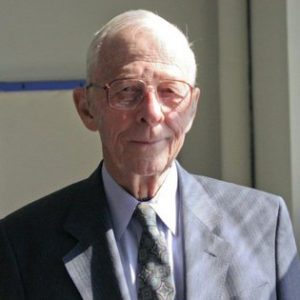Jay W. Forrester passed away on November 16th at the age of 98. Few of the readers of The Stream probably have heard of Professor Forrester directly, but all of you who have followed the curriculum that is promoted by the Middlebury School of the Environment will know of his work and influence. Professor Forrester, an electrical engineer who had insights and interests in both computer science and organizational management, provided the initial intellectual groundwork for the field of system dyna mics modeling, the basis for systems thinking.
mics modeling, the basis for systems thinking.
In his own words, system dynamics “uses computer simulation to take the knowledge we already have about details in the world around us and to show why our social and physical systems behave the way they do.”
Consider the power embedded in this simple idea for how we can protect and restore the environment. “Knowledge about the world around us,” not in terms of what we wish were true or choose to ignore, but what is actually true. The actual changes in carbon dioxide concentrations, heat retention capacity of CO2 molecules, health consequences of PCBs and lead, ecosystem consequences of phosphorus and nitrogen … and so on ad infinitum. “Show why our social and physical systems behave the way they do,” and thus revealing the true leverage points (to borrow a term from Donella Meadows) for bringing about lasting change and sustainability.
As we say repeatedly within the MSoE curriculum, systems thinking is a tool for exploring and understanding how any system works and can be changed. John Sterman at MIT explained it as such in Forrester’s obituary in the New York Times: “Simulations of dynamic systems are now indispensable throughout the physical and social sciences. Not just in management, but also, for example, in astrophysics, biology, chemistry and climate change. Jay developed the first model that treated interactions of population, the economy, natural resources, food and pollution in the context of the world as a whole. The work was counterintuitive and controversial, and it launched the field of global modeling.”
We stand on the shoulders of those who came before us. And we also build a better world with the tools that others crafted. Our debt to Jay Forrester runs deep.
His complete obituary can be read in the New York Times from November 17th.